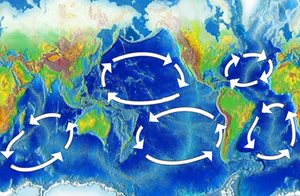gyre
English
[edit]Pronunciation
[edit]- (Received Pronunciation) IPA(key): /d͡ʒaɪ.ə/
Audio (Southern England): (file) - (General American) enPR: jīər IPA(key): /d͡ʒaɪ.ɚ/
- Rhymes: -aɪə(ɹ)
- Hyphenation: gy‧re
Etymology 1
[edit]Borrowed from Latin gȳrus (“circle; circular motion”), from Ancient Greek γῦρος (gûros, “circle; ring”), from Proto-Indo-European *gew- (“to bend; to curve”). The English word is a doublet of gyro and gyrus.[1]
Noun
[edit]gyre (plural gyres)
- (chiefly literary, poetic)
- A swirling vortex.
- A circular or spiral motion; also, a circle described by a moving body; a revolution, a turn.
- 1700, [John] Dryden, “Meleager and Atalanta, out of the Eighth Book of Ovid’s Metamorphosis”, in Fables Ancient and Modern; […], London: […] Jacob Tonson, […], →OCLC, page 112:
- Quick, and more quick he ſpins in giddy Gires, / Then falls, and in much Foam his Soul expires.
- 1856, Elizabeth Barrett Browning, “Fourth Book”, in Aurora Leigh, London: Chapman and Hall, […], published 1857, →OCLC, pages 176–177:
- What is art, / But life upon the larger scale, the higher, / When, graduating up in a spiral line / Of still expanding and ascending gyres, / It pushes toward the intense significance / Of all things, hungry for the Infinite? / Art's life,—and where we live, we suffer and toil.
- 1920, William Butler Yeats, “The Second Coming”, in Michael Robartes and the Dancer, Churchtown, Dundrum [Dublin]: The Cuala Press, →OCLC, page 19:
- Turning and turning in the widening gyre / The falcon cannot hear the falconer; / Things fall apart; the centre cannot hold; / Mere anarchy is loosed upon the world, […]
- (anatomy, zootomy, archaic) Synonym of gyrus (“a fold or ridge on the cerebral cortex of the brain”)
- (oceanography) An ocean current caused by wind which moves in a circular manner, especially one that is large-scale and observed in a major ocean.
Derived terms
[edit]Related terms
[edit]Translations
[edit]Etymology 2
[edit]From Late Middle English giren (“to turn (something) away; to cause (something) to revolve or rotate; to travel in a circle”),[2] from Old French girer (“to turn”), and directly from its etymon Latin gȳrāre, the present active infinitive of gȳrō (“to turn in a circle, rotate; to circle or revolve around”), from gȳrus (“circle; circular motion”) (see etymology 1)[3] + -ō (suffix forming regular first-conjugation verbs).
Verb
[edit]gyre (third-person singular simple present gyres, present participle gyring, simple past and past participle gyred) (literary, poetic)
- (intransitive) To spin around; to gyrate, to whirl.
- 1605, Michael Drayton, “[Songs from the ‘Shepherd’s Garland’.] From Eclogue ij.”, in Cyril Brett, editor, Minor Poems of Michael Drayton, Oxford, Oxfordshire: Clarendon Press, published 1907, →OCLC, pages 240–241, lines 4–8:
- The host of heauenly beautyes moue, / Depainted in their proper stories, / As well the fixd as wandring glories, / Which from their proper orbes not goe, / Whether they gyre swift or slowe: […]
- 1871 December 27 (indicated as 1872), Lewis Carroll [pseudonym; Charles Lutwidge Dodgson], “Looking-Glass House”, in Through the Looking-Glass, and What Alice Found There, London: Macmillan and Co., →OCLC, page 21:
- Jabberwocky. / 'Twas brillig, and the slithy toves / Did gyre and gimble in the wa[b]e; / All mimsy were the borogoves, / And the mome raths outgrabe.
- (transitive, rare) To make (something) spin or whirl around; to spin, to whirl.
Derived terms
[edit]Translations
[edit]References
[edit]- ^ “gyre, n.”, in OED Online
, Oxford: Oxford University Press, December 2020; “gyre, n.”, in Lexico, Dictionary.com; Oxford University Press, 2019–2022.
- ^ “ǧīren, v.”, in MED Online, Ann Arbor, Mich.: University of Michigan, 2007.
- ^ “gyre, v.”, in OED Online
, Oxford: Oxford University Press, December 2020; “gyre, v.”, in Lexico, Dictionary.com; Oxford University Press, 2019–2022.
Further reading
[edit]ocean gyre on Wikipedia.Wikipedia
See also
[edit]- gyre-carlin (etymologically unrelated)
Anagrams
[edit]Latin
[edit]Noun
[edit]gȳre
- English 2-syllable words
- English terms with IPA pronunciation
- English terms with audio pronunciation
- Rhymes:English/aɪə(ɹ)
- Rhymes:English/aɪə(ɹ)/1 syllable
- English terms derived from Proto-Indo-European
- English terms derived from the Proto-Indo-European root *gew-
- English terms borrowed from Latin
- English terms derived from Latin
- English terms derived from Ancient Greek
- English doublets
- English lemmas
- English nouns
- English countable nouns
- English words ending in "-yre"
- English literary terms
- English poetic terms
- English terms with quotations
- en:Anatomy
- en:Animal body parts
- English terms with archaic senses
- en:Oceanography
- English terms inherited from Middle English
- English terms derived from Middle English
- English terms derived from Old French
- English verbs
- English intransitive verbs
- English transitive verbs
- English terms with rare senses
- Latin non-lemma forms
- Latin noun forms
- Latin terms spelled with Y

